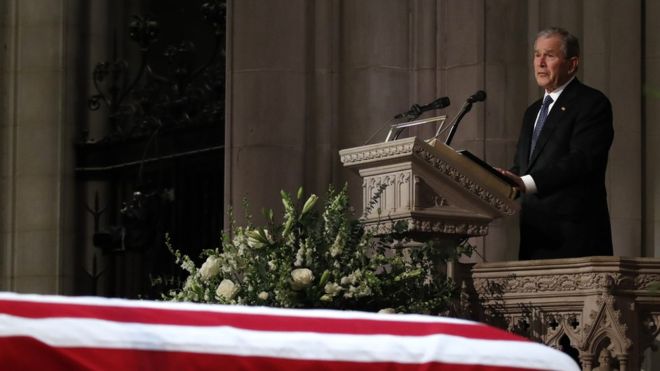|
There are funerals and there are anti-funerals.
The funeral this week of the late US President, George H.W. Bush, reminded me of three narratives that emerge when famous people die. There are celebratory eulogies, recollections, and recriminations. These discourses are delivered in two types of forum. One is the familiar funeral, and the other is a kind prominent in our time that counters the eulogies being presented. Eulogies are formal remarks ostensibly memorializing the deceased. George HW Bush’s son, ex-President George W Bush, delivered a passionate and memorable eulogy, as did 3 others. Eulogies try to verbalize what will help everyone attending the funeral be satisfied that the deceased person is being properly remembered. Eulogies “work” when they celebrate the life of the person being laid to rest. The goal is for those closest to the deceased to agree, “Yes, that covers it.” Now they have done all they are supposed to have done for their loved one and they can move on with their lives. Meanwhile, countless others are recalling times or events when the deceased made an impact on them. The memories might be as trivial as, “I was standing on the platform when his campaign train passed through and he waved.” Or as impersonal as, “His highway expansion program transformed out town.” The recollections of those with close connection or expertise might be data significant enough to record and keep track of, to be sifted when historians in the future begin to analyze not only the biographical record but the outcomes that have turned out to be significant. That, part of which is legacy, takes at least fifty years to become clear, and needs to be reviewed periodically as data troves or new methods of study become available. It is one of the mistakes of those talking about famous people to believe that historians can begin valid work any time they choose, and a funeral is one such time. One of the speakers at HW’s funeral was a “presidential historian.” When a historian purposively selects only laudatory topics or buffers troublesome issues, the result is not history but eulogy. It’s the right thing for a funeral, but it’s not history. Frequently, historical reflection will reverse an initial consensus after a full range of primary source material and analysis of long-term results of actions are seen in light of relevant factors not apparent at the time. Occasionally a person has created enough sharp divisions of opinion and effects from their actions to incite an anti-funeral – a protest or outcry against the narrative that cultural norms would prescribe for a funeral. GHW Bush’s death created this sort of second discourse. Individuals and public media felt constrained to try to correct the record, or balance the accounts, by pointing out Bush’s failures and his negative impact. They have things to say, now, while the topic is current. Those anti-funeral messages are more significant when they are, or when they make clear reference to, valuable primary sources. At first, I thought this negativity toward Bush was peculiar to our time of politicization and cultural division, but it is not. True, we are politically divided in the USA and this is becoming strident and intrusive. Also true, the funeral of a celebrity or national leader tends to urge that arguments be deferred. This is a cultural value, for all funerals, actually. Negative comments are counter-cultural. The pressure to celebrate the positive creates a climate for exaggerated favorable regard for the deceased, and this is actually what the protest is trying to restrain. Critics don’t want a movement to gain momentum that whitewashes important aspects and flaws of their dead hero. But most of the time the funeral does its job of laying the person to rest, soon to be remembered, if at all, by things mostly incidental. Immediate negative response is not new, nor peculiar to our time. When King Leopold II of Belgium died in 1909, so angry was the public at his atrocities in the Congo, they lined the funeral route and booed. Shakespeare reminds us that Julius Caesar’s cremation was intended to be a mere formality following the assassin’s prior anti-funeral until Mark Anthony turned it into a revolution. Joseph Stalin’s lavish state funeral in 1953 (during which 109 people were crushed in a stampede) was such that the anti-funeral, as it were, was delayed until Aleksandr Solzhenitzen’s works published from 1962-1971 at about the time that Stalin’s daughter, Svetlana defected to the West (March 6, 1967). [I call Solzhenitzen’s recriminatory writing “anti-funereal” because it was a direct protest against the official adulation at Stalin’s funeral and afterward, but The Gulag Archipelago was not written as history; its refutation of Stalin was implicit.] The fact that a person has a funeral is an accomplishment not all major public figures achieve. Hitler fell so completely that of the millions who would have attended there were none left to hold one when he shot himself.
1 Comment
Roy
12/7/2018 10:58:51 pm
Very interesting. I never looked at funerals like that before.
Reply
Leave a Reply. |
AuthorRev. Dr. Kenneth Dobson posts his weekly reflections on this blog. Archives
March 2024
Categories |
| Ken Dobson's Queer Ruminations from Thailand |
|

 RSS Feed
RSS Feed
